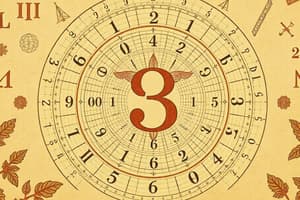Podcast
Questions and Answers
What is the focus of number theory?
What is the focus of number theory?
- Analyzing continuous functions
- Investigating properties of numbers (correct)
- Studying the relationships between sets
- Understanding geometric transformations
Which of the following is NOT a step in the structured approach to mathematical problem solving?
Which of the following is NOT a step in the structured approach to mathematical problem solving?
- Implementing the plan to obtain a solution
- Evaluating the answer for accuracy
- Ignoring previous problems (correct)
- Developing a plan to solve the problem
What role does mathematical modeling play?
What role does mathematical modeling play?
- It analyzes geometric shapes only
- It represents complex systems in quantitative terms (correct)
- It simplifies numerical approximations
- It focuses solely on abstract concepts
In which area is numerical analysis primarily used?
In which area is numerical analysis primarily used?
Which mathematical field focuses on geometric properties preserved under deformation?
Which mathematical field focuses on geometric properties preserved under deformation?
What is the primary focus of geometry?
What is the primary focus of geometry?
Which of the following represents a core skill in algebra?
Which of the following represents a core skill in algebra?
What does calculus study?
What does calculus study?
Which operation does NOT fall under the category of arithmetic?
Which operation does NOT fall under the category of arithmetic?
Which statement about statistics is correct?
Which statement about statistics is correct?
What type of equations does algebra include?
What type of equations does algebra include?
What does discrete mathematics focus on?
What does discrete mathematics focus on?
Which property of operations is essential for understanding arithmetic?
Which property of operations is essential for understanding arithmetic?
Flashcards
Mathematics Branches
Mathematics Branches
Mathematics encompasses various branches, like arithmetic, algebra, geometry, calculus, statistics, and probability.
Arithmetic Operations
Arithmetic Operations
Fundamental math operations: addition, subtraction, multiplication, and division.
Algebra Variables
Algebra Variables
Algebra uses variables to represent unknown quantities.
Geometric Shapes
Geometric Shapes
Signup and view all the flashcards
Calculus Derivatives
Calculus Derivatives
Signup and view all the flashcards
Data Analysis (Statistics)
Data Analysis (Statistics)
Signup and view all the flashcards
Probability
Probability
Signup and view all the flashcards
Equations in Algebra
Equations in Algebra
Signup and view all the flashcards
Number Theory
Number Theory
Signup and view all the flashcards
Set Theory
Set Theory
Signup and view all the flashcards
Topology
Topology
Signup and view all the flashcards
Problem Solving Steps
Problem Solving Steps
Signup and view all the flashcards
Mathematical Modeling
Mathematical Modeling
Signup and view all the flashcards
Study Notes
Introduction to Mathematics
- Mathematics is a broad field encompassing various branches, including arithmetic, algebra, geometry, calculus, and more.
- It deals with abstract concepts like numbers, shapes, and quantities.
- It utilizes logical reasoning and problem-solving techniques.
- Mathematics plays a crucial role in various fields, from science and engineering to finance and computer science.
Arithmetic
- Arithmetic covers fundamental operations: addition, subtraction, multiplication, and division.
- It forms the basis for more advanced mathematical concepts.
- Properties of operations, such as commutativity and associativity, are essential to understanding arithmetic.
- Different systems of numbers, including natural numbers, integers, rational numbers, irrational numbers, and real numbers, exist, with varying properties.
Algebra
- Algebra extends beyond arithmetic to introduce variables and equations.
- Variables represent unknown quantities, allowing for the representation of relationships between different values.
- Equations express relationships between variables using mathematical operators.
- Solving equations to find the value of unknown variables is a core skill in algebra.
- Different types of equations, such as linear, quadratic, and polynomial equations, exist with unique solving methods.
Geometry
- Geometry focuses on shapes, their properties, and their relationships.
- Different types of shapes, such as points, lines, angles, polygons, circles, and 3-dimensional figures (like cubes and spheres) exist.
- Geometric theorems and postulates describe relationships between shapes.
- Geometry plays a key role in measurement and spatial reasoning.
Calculus
- Calculus involves the study of change, including instantaneous rates of change (derivatives) and the accumulation of quantities (integrals).
- Differentiation enables finding slopes of curves at specific points.
- Integration allows the calculation of areas and volumes.
- Applications include modelling physical phenomena, designing curves, solving optimization problems, and analyzing growth patterns.
Other Mathematical Branches
- Statistics involves collecting, analyzing, and interpreting data.
- Probability deals with the likelihood of events occurring.
- Discrete mathematics is concerned with countable or discrete objects and problems.
- Linear algebra focuses on linear equations and vector spaces.
- Number theory investigates properties of numbers, such as divisibility and prime numbers.
- Set theory deals with the concepts of sets and their operations.
- Topology studies geometric properties that are preserved under continuous deformations.
Mathematical Problem Solving
- Following a structured approach to problem solving is key in mathematics, including these steps:
- Understanding the problem
- Developing a plan to solve it
- Implementing the plan to obtain a solution
- Evaluating the answer for accuracy.
- Mathematical notation and symbols are crucial for expressing problems and solutions clearly.
- Practicing different types of problems is essential to develop mathematical skills and intuition.
Applications of Mathematics
- Mathematics has practical applications across various disciplines e.g., physics, engineering, computer science, economics.
- Mathematical modeling is used to represent complex systems or phenomena in quantitative terms.
- Computational methods have become indispensable for solving mathematical problems.
- Numerical analysis uses numerical approximation for solving mathematical problems.
Studying That Suits You
Use AI to generate personalized quizzes and flashcards to suit your learning preferences.




